#nor do i care to work unpaid to meet unrealistic expectations
Text
Everyday I debate telling my manager to kick rocks.
#this women does not realize I do not get paid enough to do all the shit theyre asking#nor do i care to work unpaid to meet unrealistic expectations#like companies will take advantage of you shamelessly#and we just go along with it#mine
0 notes
Text
Rooster Teeth Glassdoor Crunch/Overtime Accusations #AnimatorsFirst
EDIT: Georden Whitman, former creator of Nomad of Nowhere, has come out and publicly confirmed the Glassdoor reviews are true.
Original story:
Rooster Teeth’s Glassdoor reviews have recently made serious allegations against the company, with people who work for the company claiming that the company engages in practices involving heavy crunch periods, a resistance to providing benefits, eighty hour work weeks, a management team trying to justify crunch and unpaid overtime that, according to some, led to as much as a third of RWBY and gen;LOCK’s recent seasons being made effectively for free.
Below are screencaps and exact quotes from the pages. Any emphasis made is done by me.
From May 23rd this year, as written by an employee with three years experience at RT:
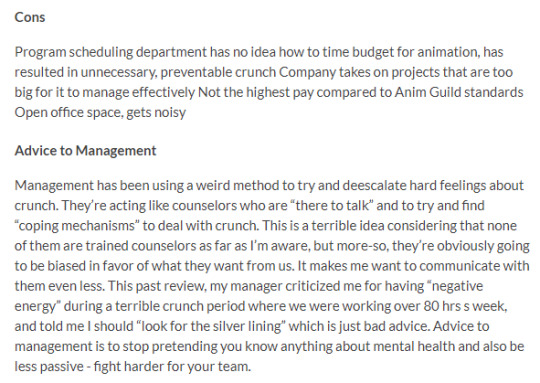
Cons
Program scheduling department has no idea how to time budget for animation, has resulted in unnecessary, preventable crunch Company takes on projects that are too big for it to manage effectively Not the highest pay compared to Anim Guild standards Open office space, gets noisy
Advice to Management
Management has been using a weird method to try and deescalate hard feelings about crunch. They’re acting like counselors who are “there to talk” and to try and find “coping mechanisms” to deal with crunch. This is a terrible idea considering that none of them are trained counselors as far as I’m aware, but more-so, they’re obviously going to be biased in favor of what they want from us. It makes me want to communicate with them even less. This past review, my manager criticized me for having “negative energy” during a terrible crunch period where we were working over 80 hrs s week, and told me I should “look for the silver lining” which is just bad advice. Advice to management is to stop pretending you know anything about mental health and also be less passive - fight harder for your team.
From May 13th, an employee with a year’s experience at Rooster Teeth:

Cons
The management is terrible. Artists are lead on with the promises of "full time employment and benefits" dangled in front of them without ever being addressed and ultimately are never given, there is no paid overtime, artists had to fight for their right to time off between productions, and good luck getting any form of benefits despite them being plastered on the wall.
Advice to Management
You're not a group of guys playing halo in your apartment anymore. Please run your business and look at what's happened to it.
From June 11th this year, from an employee who has been working at the company for five years:
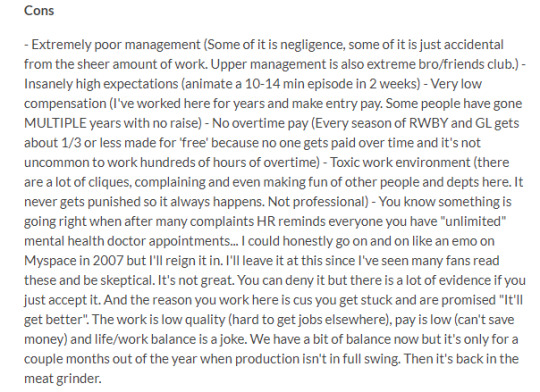

Cons
- Extremely poor management (Some of it is negligence, some of it is just accidental from the sheer amount of work. Upper management is also extreme bro/friends club.)
- Insanely high expectations (animate a 10-14 min episode in 2 weeks) - Very low compensation (I've worked here for years and make entry pay. Some people have gone MULTIPLE years with no raise)
- No overtime pay (Every season of RWBY and GL gets about 1/3 or less made for 'free' because no one gets paid over time and it's not uncommon to work hundreds of hours of overtime)
- Toxic work environment (there are a lot of cliques, complaining and even making fun of other people and depts here. It never gets punished so it always happens. Not professional)
- You know something is going right when after many complaints HR reminds everyone you have "unlimited" mental health doctor appointments... I could honestly go on and on like an emo on Myspace in 2007 but I'll reign it in. I'll leave it at this since I've seen many fans read these and be skeptical. It's not great. You can deny it but there is a lot of evidence if you just accept it. And the reason you work here is cus you get stuck and are promised "It'll get better". The work is low quality (hard to get jobs elsewhere), pay is low (can't save money) and life/work balance is a joke. We have a bit of balance now but it's only for a couple months out of the year when production isn't in full swing. Then it's back in the meat grinder.
Advice to Management
You NEED to listen to the workers and make hard decisions and actually fight for better conditions. It's been far far too long of "it'll get better" or "we know what to do next year". This isn't sustainable and I think we all know it. But someone has to be the guy to say "no" when things aren't good enough. If you don’t say no, hundreds of people suffer. Please.
From May 18th:

Cons
Crunch has gotten to an unacceptable level. Productions have been completed with over half of total hours unpaid overtime, especially impacting the comp and editing department. Management cares more about their ego than the quality of the work they put out— letting the crunch caused by their irresponsible decisions fall solely on the shoulders of the artists while they enjoy a forty hour work week. Pay is laughable compared with the amount of mandated, unpaid hours of labor. No career advancement, and contract workers are given empty promises of full time employment before being shown the door once production is done.
Advice to Management
Stop saying the crunch issue is “getting better” or that you’re “working on it”, and start actually owning up to your mistakes.
From May 19th:
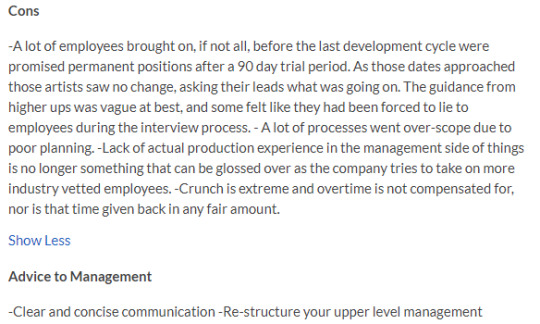
Cons
-A lot of employees brought on, if not all, before the last development cycle were promised permanent positions after a 90 day trial period. As those dates approached those artists saw no change, asking their leads what was going on. The guidance from higher ups was vague at best, and some felt like they had been forced to lie to employees during the interview process.
- A lot of processes went over-scope due to poor planning.
-Lack of actual production experience in the management side of things is no longer something that can be glossed over as the company tries to take on more industry vetted employees.
-Crunch is extreme and overtime is not compensated for, nor is that time given back in any fair amount.
Advice to Management
-Clear and concise communication -Re-structure your upper level management
From May 12th:

Cons
Crunch here is out of control. No Paid OT. Expect to work A LOT for free. 70-80 hour work weeks. Mandatory 10-12 hour work days sometimes with no days off. Management is more interested in telling you what you want the hear as opposed to the truth.
Advice to Management
Fix the crunch issue and stop saying 'we're working on it'.... because you're not. Layoffs are certain. Will layoff bad employees and good employees in the same breath, completely eliminating any reason to work as hard as you're required to do. Fix your transparency issue and stop overworking your employees otherwise your reputation will severely suffer.
From April 5th:
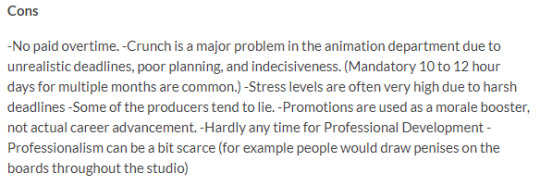
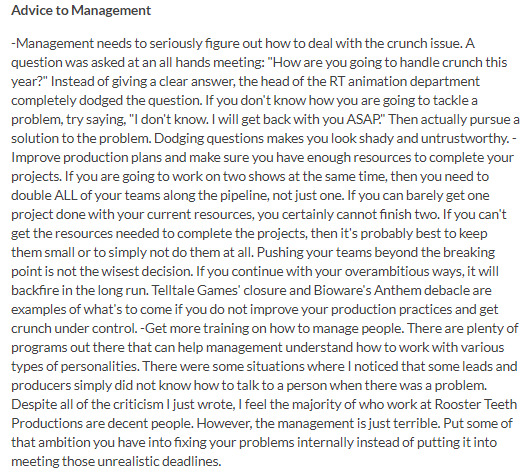
Cons
-No paid overtime. -Crunch is a major problem in the animation department due to unrealistic deadlines, poor planning, and indecisiveness. (Mandatory 10 to 12 hour days for multiple months are common.)
-Stress levels are often very high due to harsh deadlines
-Some of the producers tend to lie.
-Promotions are used as a morale booster, not actual career advancement.
-Hardly any time for Professional Development
-Professionalism can be a bit scarce (for example people would draw penises on the boards throughout the studio)
Advice to Management
-Management needs to seriously figure out how to deal with the crunch issue. A question was asked at an all hands meeting: "How are you going to handle crunch this year?" Instead of giving a clear answer, the head of the RT animation department completely dodged the question. If you don't know how you are going to tackle a problem, try saying, "I don't know. I will get back with you ASAP." Then actually pursue a solution to the problem. Dodging questions makes you look shady and untrustworthy. -Improve production plans and make sure you have enough resources to complete your projects. If you are going to work on two shows at the same time, then you need to double ALL of your teams along the pipeline, not just one. If you can barely get one project done with your current resources, you certainly cannot finish two. If you can't get the resources needed to complete the projects, then it's probably best to keep them small or to simply not do them at all. Pushing your teams beyond the breaking point is not the wisest decision. If you continue with your overambitious ways, it will backfire in the long run. Telltale Games' closure and Bioware's Anthem debacle are examples of what's to come if you do not improve your production practices and get crunch under control. -Get more training on how to manage people. There are plenty of programs out there that can help management understand how to work with various types of personalities. There were some situations where I noticed that some leads and producers simply did not know how to talk to a person when there was a problem. Despite all of the criticism I just wrote, I feel the majority of who work at Rooster Teeth Productions are decent people. However, the management is just terrible. Put some of that ambition you have into fixing your problems internally instead of putting it into meeting those unrealistic deadlines.
From March 25th:
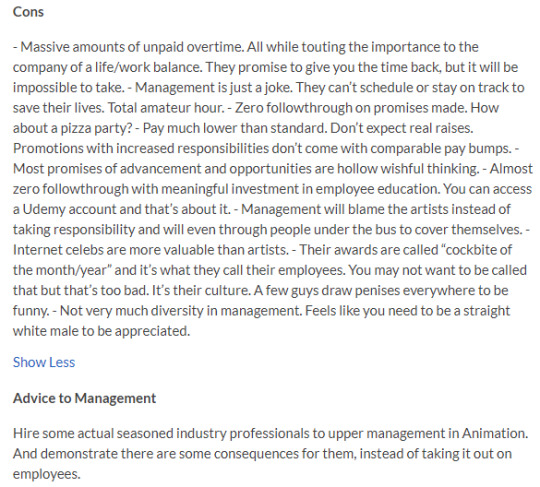
Cons
- Massive amounts of unpaid overtime. All while touting the importance to the company of a life/work balance. They promise to give you the time back, but it will be impossible to take.
- Management is just a joke. They can’t schedule or stay on track to save their lives. Total amateur hour.
- Zero followthrough on promises made. How about a pizza party?
- Pay much lower than standard. Don’t expect real raises. Promotions with increased responsibilities don’t come with comparable pay bumps.
- Most promises of advancement and opportunities are hollow wishful thinking.
- Almost zero followthrough with meaningful investment in employee education. You can access a Udemy account and that’s about it.
- Management will blame the artists instead of taking responsibility and will even through people under the bus to cover themselves.
- Internet celebs are more valuable than artists.
- Their awards are called “cockbite of the month/year” and it’s what they call their employees. You may not want to be called that but that’s too bad. It’s their culture. A few guys draw penises everywhere to be funny. - Not very much diversity in management. Feels like you need to be a straight white male to be appreciated.
Advice to Management
Hire some actual seasoned industry professionals to upper management in Animation. And demonstrate there are some consequences for them, instead of taking it out on employees.
From April 11th:
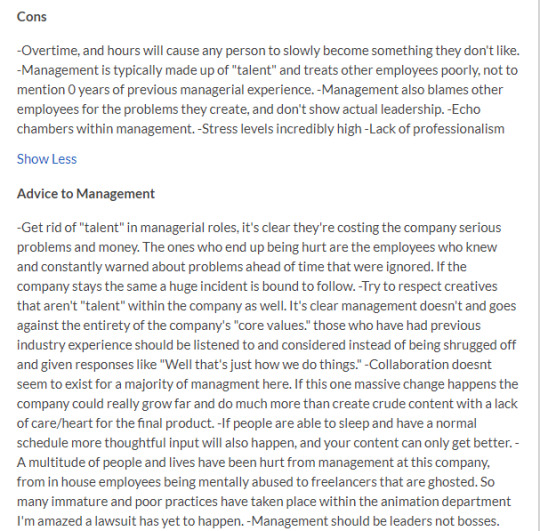
Cons
-Overtime, and hours will cause any person to slowly become something they don't like.
-Management is typically made up of "talent" and treats other employees poorly, not to mention 0 years of previous managerial experience.
-Management also blames other employees for the problems they create, and don't show actual leadership.
-Echo chambers within management.
-Stress levels incredibly high
-Lack of professionalism
Advice to Management
-Get rid of "talent" in managerial roles, it's clear they're costing the company serious problems and money. The ones who end up being hurt are the employees who knew and constantly warned about problems ahead of time that were ignored. If the company stays the same a huge incident is bound to follow. -Try to respect creatives that aren't "talent" within the company as well. It's clear management doesn't and goes against the entirety of the company's "core values." those who have had previous industry experience should be listened to and considered instead of being shrugged off and given responses like "Well that's just how we do things." -Collaboration doesnt seem to exist for a majority of managment here. If this one massive change happens the company could really grow far and do much more than create crude content with a lack of care/heart for the final product. -If people are able to sleep and have a normal schedule more thoughtful input will also happen, and your content can only get better. -A multitude of people and lives have been hurt from management at this company, from in house employees being mentally abused to freelancers that are ghosted. So many immature and poor practices have taken place within the animation department I'm amazed a lawsuit has yet to happen. -Management should be leaders not bosses.
It’s almost darkly funny that most of the positives are just “They give you free food on Mondays and the people are nice.”
But these are all from just the last year alone. Most reviews from before the start of 2019 don’t speak of crunch barring one from April 2018, one from March 2018 and one from June. This is a problem that has been affecting Rooster Teeth for at least an entire year, and since the start of the new year, the problem has magnified tenfold. Most reviews mention that the heads of departments are aware of the crunch and unpaid overtime but refuse to do anything about it beyond offering platitudes or dodging the question on what the company is going to actually do to fix the crunch problem.
Crunch is a problem plaguing many companies, especially in the western hemisphere. In gaming development there’s a story nearly every month about what apathetic upper management think they can get away with by forcing employees to spend dozens of hours every week slaving away on their product. I hoped that Rooster Teeth would not be one of these companies, but I am saddened to see that they were not.
Crunch’s negative effects on mental and physical health have been well documented, alongside the basic fact that crunch isn’t worth it and doesn’t work. Employees forced to crunch are unable to work as well as employees who are well rested and have time to go home to their families.
To anyone working these impossible crunch hours at Rooster Teeth right now, I hope your suffering ends soon, that eventually basic human empathy wins out and hours are lessened while you receive your just rewards for your work.
For @roosterteeth? This is appalling and a slap in the face to the fanbase you conned into thinking that you were a company that cared for everyone within as a huge family. Your entire management team should be ashamed of the environment you signed off on. No profit margin is worth the suffering you have subjected your crew to. Shame on you.
As a fan of RWBY, it disgusts me that a product I enjoy was made through blood, sweat and tears. And as a fan of RWBY, I wish to make a public call to the fanbase, be it on Tumblr, Reddit, Twitter or Youtube. I want to make a public statement to Rooster Teeth that we are willing to wait longer for new shows if it means that they are made ethically. I can’t in good conscience support a product if it was made by putting the workers through hell. Maybe I can’t change anything on my own, maybe ultimately we’ll just be ignored, but I refuse to stand by and stay silent on the matter, maybe even get Rooster Teeth to make changes in their workflow (I won’t say “I hope they respond” because they seem to respond in-house to complaints about crunch without ever actually changing anything)
I encourage you to share this around as much as you can. Share the accounts of the Glassdoor reviews as far and as wide as you can. We love and enjoy media, we love the people who make it- the animators, editors, writers and voice actors, and we as a community want them to not have to resort to RT’s seemingly unlimited mental health coverage or “find a coping mechanism to deal with crunch.” As much as it pains me to admit, I’d rather see RWBY die instead of seeing continue to be made on the back of crunch.
Thank you for reading. Again, I encourage you to share this around as much as you can. Let your voice be heard if you stand against this.
5K notes
·
View notes
Text
Why the daunting economics of elder care are about to get much worse
http://bit.ly/2HXuZI5
youtube
Most caregivers today are assisting their relatives. What will happen in the years ahead? ChaiyonS021/Shutterstock.com
My sister Carol loves movies, but she hasn’t been out to see one in years. When she tries to watch one at home, she’s frequently interrupted. She shrugs this off, saying “Who needs to see movies when you’re living one?”
You see, my sister is living the plot from the movie “Groundhog Day.” She takes care of our mother, who suffers from dementia. Our mom asks the same questions over and over and only wants to watch a handful of classic TV shows, like “The Golden Girls” reruns. For this my sister earns nothing.
I marvel at how hard my sister works and how much she contributes to our mother’s quality of life and yet how little our society recognizes the scope of what family caregivers like her are contributing. As an economist, I also see in her predicament a microcosm of a much bigger problem. Just as our family can’t expect my sister to keep this up indefinitely, nor can our society count on unpaid caregivers to perpetually tend to the growing needs of the nation’s elderly.
Valuing unpaid elder care
Carol belongs to an army of more than 43.5 million people who provide their loved ones with what AARP estimates to be US$470 billion worth of care – an amount that exceeds the gross domestic product of 170 of the world’s 195 nations.
Because no money changes hands, economists don’t count unpaid caregiving when they tabulate GDP – the sum of all economic activity. But this work does count tremendously in terms of the well-being, economic and otherwise, of the elderly and the disabled and their relatives.
Expecting that everyone in my mom’s predicament will have adult children able and willing to care for them is becoming increasingly unrealistic. Demographers expect that the number of Americans over age 65 will more than double in less than 50 years, rising from 46 million in 2016 to 98 million in 2060. The many seniors with one or more chronic conditions will require professional and informal assistance.
Who will take care of all these additional seniors?
The average number of children women have has declined, falling to 1.9 in 2016 from 3.7 in the 1960s. That leaves fewer children to care for the growing number of elderly parents. And since the share of women who earn a living in the paid workforce rose from about 1 in 3 in the mid-1950s to more than 1 in 2 by the 1980s, grown daughters have become less available to care for their parents at a time when the majority of people providing for seniors are still women. For example, sons caring for a parent did 16 percent of this unpaid caregiving while daughters did 31 percent, in 2011.
Caring for elderly and disabled family members takes a big financial toll, including hundreds of thousands of dollars in lifetime earnings if it means retiring early to do it, according to Fidelity, the investment company.
U.S. women are having fewer kids, making big families less common and creating consequences down the line for elder care. Dasha Petrenko/Shutterstock
Paid caregivers
When no relative steps up to serve as an unpaid caregiver when the need arises, families hire paid caregivers or move their loved one into a nursing home, where a private room may cost $100,000 or more per year. Medicare rarely covers nursing home stays, and eligibility for Medicaid coverage is limited, so institutional care like that is generally out of reach for all but the wealthiest Americans or those with long-term care insurance – which also costs a lot.
The Bureau of Labor Statistics predicts that caregiving jobs will be among the fastest-growing in the years to come, with the number of home health aides increasing by 41 percent from nearly 3 million in 2016 to more than 4.1 million within a decade.
However, many states already face a shortage of these workers. Partly that’s because these jobs pay very little – averaging $22,170 per year in 2016 for home health aides – and offer scant benefits. Compensation is so low that about half of paid caregivers rely on some form of government assistance to make ends meet.
The industry’s low pay helps explain why roughly a quarter of home health workers are immigrants. Until now, foreign-born labor has narrowed this labor gap. The Trump administration’s efforts to crack down on undocumented immigration and reduce the number of immigrants with legal status, therefore, are sure to make it harder for families seeking someone to care for an aging relative to hire workers.
I believe any serious debate over immigration policy should consider the growing need for paid caregivers and establish more ways for immigrants willing and able to do this work with a path to citizenship. There are specific visa programs for agriculture and hospitality. Why not caregiving?
Ai-jen Poo, an advocate of expanding the care workforce and improving its labor conditions, explaining at TEDxMiddlebury why she co-founded the Caring Across Generations campaign.
What else might help
Men are often hesitant to take jobs in caregiving due to gender stereotypes. If those attitudes were to change, the pool of potential caregivers both paid and unpaid would expand. However, transforming gender attitudes is a difficult and long process.
In the meantime, Medicaid and Medicare can make caregiving more financially rewarding by increasing the rates they pay for elder care, spurring the kind of salary growth for home health aides required to make the profession more attractive.
And to ease the financial burden of caregiving all around, Medicaid and Medicare could ramp up benefits for care delivered in the home and in institutions and extend coverage to more people.
Another way to ease this financial burden would be to adjust the tax code.
Congress appears to be inching in that direction. Several members, including Sens. Shelley Moore Capito, a West Virginia Republican, and Tammy Baldwin, a Wisconsin Democrat, introduced the Credit for Caring Act in 2017. The measure, which didn’t make it into the tax code overhaul, would give Americans who earn at least $7,500 a year and also care for relatives with specific disabilities a tax credit worth up to $3,000.
If enacted, this would mark a step in the right direction. But I believe much more needs to be done to prepare for the coming wave of elderly Americans, millions of whom will require assistance.
This legislation would do nothing, for example, for people like my sister who do unpaid caregiving work full-time and arguably need the most help.
Patricia Smith does not work for, consult, own shares in or receive funding from any company or organization that would benefit from this article, and has disclosed no relevant affiliations beyond their academic appointment.
0 notes